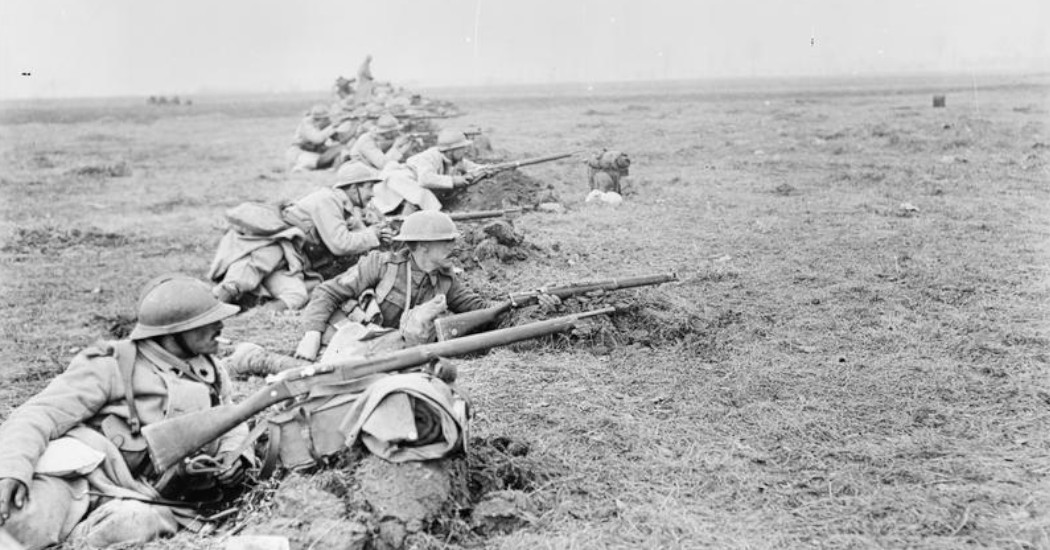
Photo by Second Lieutenant Thomas Keith Aitken, March 1918, part of the Ministry of Information First World War Official Collections on iwm.org.uk.
My Great Grandad, Thomas Stott
Thomas Stott was born on 5th June 1887 in Crompton, Lancashire, to parents James and Elizabeth Stott (née Robinson). He had three younger sisters.
In February 1912, Thomas married Charlotte Jane Hunston and they had three sons.
Thomas saw active WWI service in France between 1 January – 14 April 1918 (now aged 31), with the Manchester Regiment, 11th battalion (Service No. 52055).
As detailed in the 11th battalion war diaries, the battalion were in Burbure, France training for most of January 1918, before moving to the front line at Verquin on 22 January.
In February, they provided support at the front line in Philosophe and St Elie, before moving to the front line east of Vermelles, and providing support in Philosophe, in March.
On 17 March they saw enemy action east of Vermelles, with the battalion diary describing “gas shells in large quantities”. On the 20 March, the diary says that they were “totally unprovided with anti-gas applications”.
At the end of March and throughout April, the battalion were in support of, and on, the front line east of Vermelles. The diary describes most days as quiet, but with regular reports of gas shells throughout the night. This area was subjected to the German Spring Offensive. The Somme Offensive was the first German drive, 21 March to 4 April 1918, south of Lens. The second German drive was the Lys Offensive, 9 to 29 April, 1918 (aka Operation Georgette), north of Lens. Vermelles and Noyelles-les-Vermelles, north-west of Lens were midway between these two offensive drives.
The enemy deliberately exploited the fear of chemical weapons. An infantry assault on the British First Army at Vermelles on 27 April 1916 was preceded by lachrymatory gas shells and clouds of harmless smoke. Before the second attack, an hour later, lethal chlorine was released, designed to surprise soldiers who had removed their respirators (War Hist, 2014).
Thomas left the front line mid-April 1918. His pension record shows that he suffered from the effects of gas, and he was discharged a year later on 17 March 1919. In March 1920, at the age of 37, Thomas was awarded a weekly pension, to be paid until February 1921, almost a year.
In 1921, he moved to the Royal Defense Corps (service no. 90666), a battalion for soldiers who couldn’t return to the front. By 19th June, 2021, the date of the census, Thomas was living at Manchester Road with his wife and three sons. He was working as a cotton spinner at the Newby Mill, Shaw, as was his father, while his youngest sister Elizabeth was a winder there.
The National Archives Medal Index lists him as being awarded the Victory Medal (awarded to those who entered a theatre of war) and British War Medal (awarded to those who rendered service during the war).
After the war, Thomas lived on Manchester Road, Shaw, and then at his parents’ house on Fraser Street, Shaw. He often spent time in the neighbouring Comrades Club on Manchester Rd, Shaw (which is still there), named for the Oldham Battalion of Comrades, a Pioneer Battalion, the 24th Manchester Regiment. He suffered from what we now call post-traumatic stress disorder for the rest of his life, becoming quite distant from his family in later life and being looked after by his youngest sister. Census records show that Thomas worked in textiles: 1901 (aged 13) and 1911 as a mule piecer, and in 1921 and 1939 as a cotton spinner.
Thomas died in 1963, and was buried in the September.